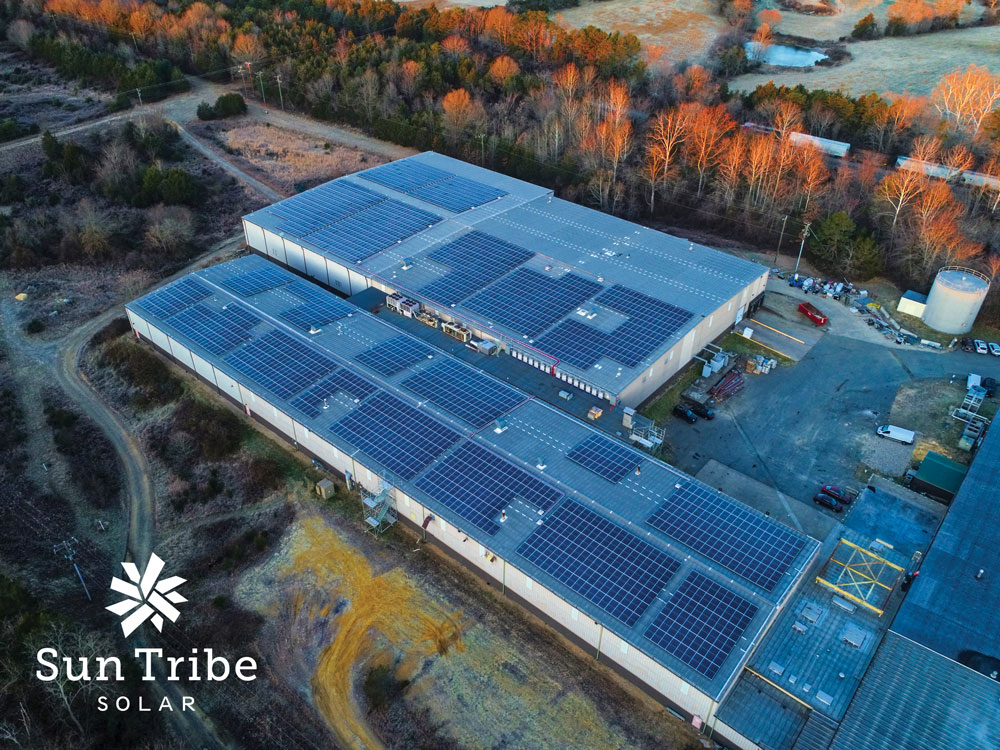
Green Applications | Gordonsville, Va. | 868 kW
Green Applications is a printer and distributor of textile merchandise, and this is the largest net-metered distributed generation project in the entire state of Virginia. Projects like these are helping to grow the market in Virginia, showing that C&I solar works financially. Working with the VirginiaSAVES program, Sun Tribe Solar was able to secure investors to move the project forward as a Power Purchase Agreement.
Sustainability directors are faced with increasing pressure to establish ambitious sustainability goals for their companies, but what they often lack are the right partners to help bring them to fruition. Charting a path from sustainability goal inception to completion requires strategic partnerships with industry experts willing to stick by companies for the long-haul, which often means years of committed investment.
This challenge is exceedingly true when talking about the accelerated pace of innovation in our new energy era. Sustainability directors require not only a dependable corporate energy provider, but one that can advise on diverse and customizable energy portfolio offerings. As the transformation of energy use and efficiency continues to evolve, so must the strategies that corporate energy providers advise upon.
“Companies have a responsibility to ensure they are operating in a sustainable manner and setting goals to outline what that responsibility means to them is an important part of that journey,” says Sarah McElroy, analyst at SustainAbility. “The best goals create shared value, and this requires, at the very least, stronger alignment with the business model, and sometimes outright transformation.”
Sustainability leaders are setting goals for 2030, 2040 and beyond. Gone are the days that providers offer only one solution — a partner’s offerings must include a wider set of solutions to approach energy management holistically within the greater context of a company’s goals, mission and values.
A definitive sign that there is an increased demand for renewable energy can be seen in the increased memberships to RE100, a collaborative, global initiative uniting influential businesses committed to 100 percent renewable electricity. Since July 2017 alone, the membership count has jumped 31 percent. With an amplified focus on renewables by organizations large and small, partners must be able to provide companies with energy models rooted in deep knowledge, analysis and innovation.
Furthermore, a corporate energy provider’s bankability allows the customer to feel more confident about choosing the right long-term energy strategy. They should pick partners that they know will be with them to see those goals through to completion, and strong financial backing ensures that a partner’s financial state doesn’t throw a wrench in their company’ future sustainability goals. Not to mention, a corporate energy provider should have the ability to offer financing options that allow customers the flexibility to make the best decisions for their projects, from physical and virtual PPAs and leases to loans and cash.
As the energy market matures, sustainability directors will have different needs and opportunities to create more value out of their sustainability investments than in the past. With this in mind, they will need to find a partner that helps them optimize their overall energy plan and not just the individual system they are accustomed to. On top of that, a great energy strategy must be simple enough for any customer to understand, no matter how experienced they are in the purchasing journey.
A trusted energy adviser must go above and beyond those expectations by helping a company choose a package that works for them both in the present day and 20 to 30 years from now. After all, sustainability directors aren’t always experts in all of the renewable energy solutions out there, nor should they need to be. The energy environment is diverse and complicated, and partners must help sustainability directors understand how they can achieve their energy goals.
Whether it’s rooftop solar, a largescale wind farm, a microgrid-as-a-service or any other combinations of energy technology and services, the partner must identify solutions that shift energy from a cost center to a value-adding strategy.
Craig Noxon is the VP of enterprise sales at REC Solar.
— Solar Builder magazine
Leave a Reply
You must be logged in to post a comment.